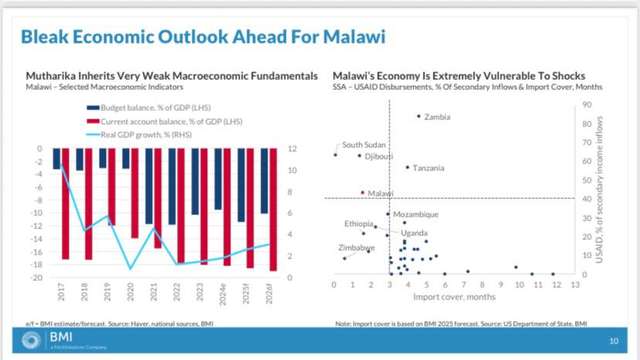How will Malawi's re-elected president deliver economic growth?

Malawi has entered a new political chapter with the return of 85-year-old Peter Mutharika, who scored a resounding victory in the September 16 election.
His comeback, after a five-year absence from power, reflects deep public discontent with economic stagnation under President Lazarus Chakwera. However, Mutharika inherits an economy in crisis, characterised by inflation exceeding 30%, depleted foreign reserves, and widespread poverty.
A fragile mandate amid divided politics
Mutharika’s Democratic Progressive Party (DPP) secured a decisive presidential win, but parliamentary seats are fragmented, with the Malawi Congress Party (MCP) and smaller groups holding significant sway. This means policy will require coalition building.

A resounding victory for Mutharika but will need cross-party cooperation to advance government's business in parliament.
The economic reality: a country under strain
A new analysis by Fitch Solutions’ BMI highlights just how precarious Malawi’s economy has become, underscoring the uphill battle for newly re-elected President Peter Mutharika. The data show Malawi’s budget and current account deficits have remained stubbornly high for years, with both hovering deep in negative territory since 2017.
Fiscal shortfalls consistently exceed 8–10% of GDP, while current account gaps further strain the balance sheet. Real GDP growth, meanwhile, remains modest, projected below 4% into 2026. This combination of sluggish growth and structural deficits leaves Malawi highly exposed to external shocks.
Malawi’s economy is among the most aid-dependent in Sub-Saharan Africa. U.S. foreign assistance and multilateral aid make up a large share of secondary income inflows. At the same time, Malawi has barely 1.5 months of import cover, critically below the IMF’s recommended threshold.
In contrast, regional peers such as Zambia and Tanzania enjoy stronger external buffers, with higher import cover and less reliance on aid.

What Mutharika promises and what stands in the way
Mutharika is remembered for delivering relative stability in his earlier term (2014–2020), when inflation fell to single digits and roads were built. Yet his legacy was clouded by allegations of cronyism, which may affect donor confidence today.
Economists say his government must prioritise:
- Fiscal consolidation: Cutting deficits through tighter spending controls and improved tax collection.
- Currency and monetary reforms: Restoring credibility to the kwacha by aligning it with market realities.
- Reviving agriculture: Addressing fertiliser shortages and maize price spikes to ease food insecurity.
- Energy and infrastructure: Expanding electricity generation and transport networks to attract private investment.
- Anti-corruption measures: To restore donor trust and unlock external financing.
Cautious optimism, high risks
Fitch Solutions warns that Mutharika will likely need “cross-party deals” to govern effectively, while policy missteps or stalled reforms could push the country into a deeper crisis. His administration must restore economic stability through tighter fiscal discipline, credible monetary policies, and structural reforms. Otherwise, Malawi risks deepening its dependence on aid and falling further behind its regional peers. overshadowing recovery.
This story is written and edited by the Global South World team, you can contact us here.